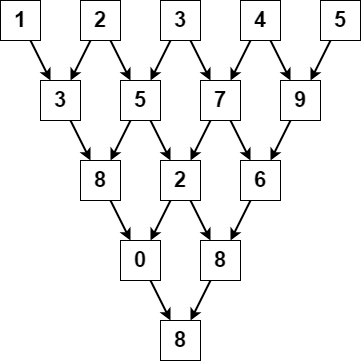Problem 2928. Distribute Candies Among Children I
-
You are given two positive integers
nandlimit. -
Return the total number of ways to distribute
ncandies among3children such that no child gets more thanlimitcandies.
Examples
-
Example 1:
- Input: n = 5, limit = 2
- Output: 3
- Explanation: There are 3 ways to distribute 5 candies such that no child gets more than 2 candies: (1, 2, 2), (2, 1, 2) and (2, 2, 1).
-
Example 2:
- Input: n = 3, limit = 3
- Output: 10
- Explanation: There are 10 ways to distribute 3 candies such that no child gets more than 3 candies: (0, 0, 3), (0, 1, 2), (0, 2, 1), (0, 3, 0), (1, 0, 2), (1, 1, 1), (1, 2, 0), (2, 0, 1), (2, 1, 0) and (3, 0, 0).
Constraints
1 <= n <= 501 <= limit <= 50
Solution
/**
* @param {number} n
* @param {number} limit
* @return {number}
*/
var distributeCandies = function(n, limit) {
let ways = 0;
for (let i = 0; i <= limit; i++) {
for (let j = 0; j <= limit; j++) {
const k = n - i - j;
if (k >= 0 && k <= limit) {
ways++;
}
}
}
return ways;
};Problem 1641. Count Sorted Vowel Strings
Given an integer n, return the number of strings of length n that consist only of vowels (a, e, i, o, u) and are lexicographically sorted.
A string s is lexicographically sorted if for all valid i, s[i] is the same as or comes before s[i+1] in the alphabet.
Examples
- Example 1:
- Input: n = 1
- Output: 5
- Explanation: The 5 sorted strings that consist of vowels only are ["a","e","i","o","u"].
- Example 2:
- Input: n = 2
- Output: 15
- Explanation: The 15 sorted strings that consist of vowels only are
["aa","ae","ai","ao","au","ee","ei","eo","eu","ii","io","iu","oo","ou","uu"].- Note that "ea" is not a valid string since 'e' comes after 'a' in the alphabet.
Constraints
1 <= n <= 50
Solution
/**
* @param {number} n
* @return {number}
*/
var countVowelStrings = function(n) {
const vowels = ['a', 'e', 'i', 'o', 'u'];
const answer = [];
const getCombination = (startIndex, rest) => {
if (rest.length === n) {
answer.push(rest.join(''));
return;
}
for (let i = startIndex; i < vowels.length; i++) {
rest.push(vowels[i]);
getCombination(i, rest);
rest.pop();
}
};
getCombination(0, []);
return answer.length;
};Problem 2221. Find Triangular Sum of an Array
-
You are given a 0-indexed integer array
nums, wherenums[i]is a digit between0and9(inclusive). -
The triangular sum of
numsis the value of the only element present innumsafter the following process terminates:- Let
numscomprise ofnelements. Ifn == 1, end the process. Otherwise, create a new 0-indexed integer arraynewNumsof lengthn - 1. - For each index
i, where0 <= i < n - 1, assign the value ofnewNums[i]as (nums[i] + nums[i+1]) % 10, where%denotes modulo operator. - Replace the array
numswithnewNums. - Repeat the entire process starting from step 1
- Let
-
Return the triangular sum of nums.
Examples

-
Example 1:
- Input: nums = [1,2,3,4,5]
- Output: 8
- Explanation:
- The above diagram depicts the process from which we obtain the triangular sum of the array.
-
Example 2:
- Input: nums = [5]
- Output: 5
- Explanation:
- Since there is only one element in nums, the triangular sum is the value of that element itself.
Constraints
1 <= nums.length <= 10000 <= nums[i] <= 9
Solution
/**
* @param {number[]} nums
* @return {number}
*/
var triangularSum = function (nums) {
const getTriangularSums = array => {
if (array.length === 1) {
return array[0];
}
const newNums = [];
for (let i = 0; i < array.length - 1; i++) {
newNums[i] = (array[i] + array[i + 1]) % 10;
}
return getTriangularSums(newNums);
};
return getTriangularSums(nums);
};